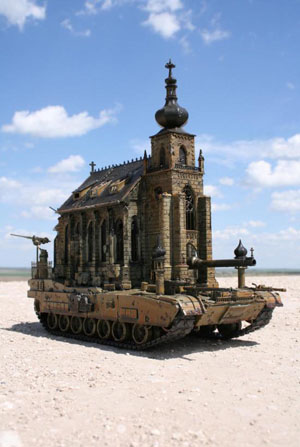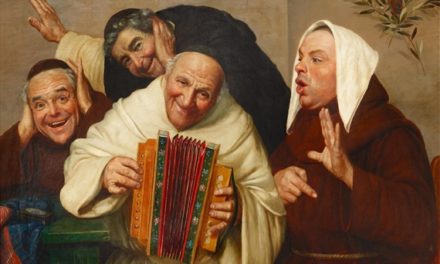We start a new series here in Season 2 of CS. This time we’ll take a look at some of the notable Heretics & Heresies in Church History. Most of these we covered in Season 1. This time we’ll go a bit deeper. As we do, we just might discover that some of those movements and groups that have been classed as heretical, weren’t. Aberrant maybe, but heretical, not! As has been said; Winners write history. They get to tell the tale. It seems at least some of the reporting of Church officials misrepresented / mischaracterized the position of those they opposed and were able to stamp out. When the writings of these groups were systematically round & destroyed, all we’re left with is the account of their opponents; a questionable source at best.
That is not to say every group deemed heretical wasn’t. Many were. In the early centuries most were. But during the late Middle Ages, many of the groups labeled “heretical” may have simply been outsiders to the politically accepted norm.
As we begin, we need to carve out a little time to define precisely what we mean by heresy.
The English word “heresy” is a transliteration of the Greek word hairesis which simply means “party” as in a sect; a group of people gathered around some identifying & uniting feature. The early use of the word was neutral and is seen that way 3 times in the Book of Acts. (5:17, 15:5 & 26:5)
But the word took on a strongly negative connotation early when it was used to describe those who deviated from the teaching of the Apostles and went off into error, as seen in 1 Cor 11:19 & Gal 5:20. Heresy wasn’t just a difference of opinion on some minor issue. It was a departure from those aspects of The Gospel that made Christianity what it fundamentally was as a coherent faith. If accepted, a heretical teaching placed the adherent outside the saving benefits of The Gospel. Heresy wasn’t just a difference of opinion; it was a difference in Belief regarding Truth.
The antonym of heresy is orthodoxy; a word derived from 2 Greek words meaning right and honor. Orthodoxy honors God rightly. Heresy dishonors God by clinging to ideas about Him and His ways that are untrue.
In order for something to be genuinely heretical, it needs to have some point of orthodoxy against which it kicks. So, atheism can’t be considered heretical since it doesn’t just deviate from theism. It categorically rejects theism. There isn’t any point of connection between the two. They are diametrically opposite worldviews.
For convenience sake, people have made a distinction between heresy and mere aberration. A heresy places the one who embraces it outside the realm of saving faith. The heretic is someone regarded as doomed to hell because she/he fails to hold faith in The Gospel of Jesus Christ as defined by the Apostles in the New Testament. Aberrant beliefs and movements are those that have deviated from the general stream of Christian orthodoxy in some non-essential realm of belief or practice. That is not to say aberrations aren’t potentially dangerous; they may be. But embracing them doesn’t exempt someone from salvation. It may hinder some aspect in their experience of a complete Christian life, but it won’t eternally doom them.
What I’m about to share now is difficult for some moderns to grasp. But it’s crucial to understanding how the Church has historically understood and dealt with heresy. The Enlightenment’s emphasis on secularism has profoundly colored Western civilization. While the roots of Western Civilization lie deep in a Biblical worldview, secularism has nevertheless managed to insinuate itself into that worldview, turning the ancient and medieval preoccupation with “the life to come” into a preoccupation with “this life now.” Simply put modern people tend to ask, “What is Faith doing for me right now,” rather than the question that framed the thinking of centuries worth of people across the Middle East and Europe, “How does faith fit me for the life to come?”
The modern standard of living in democratic political and affluent economic systems presents people with a plethora of options and lifestyle choices simply not available to most of humanity throughout history. So people today tend to evaluate a philosophy or religion based on what benefits it accrues to them NOW; in this moment, which is the essence of secularism.
For the vast majority of people in ancient & medieval realms, living as they did in squalor with a tenuous hold on survival, this life was far less important than eternity. For as bad as this life might be for the poor and slaves, it was but a vapor compared to eternity; a bad dream to be dispelled and forgotten in the light of Heaven. And what gained heaven wasn’t anything the temporary world of today reckoned as important or valuable. No – what gained heaven is open and available to all equally in the Gospel of Jesus Christ. In Heaven, the rich would have no advantage on the poor; the slave, no disadvantage to the free. All such distinctions were left at the portal between this world and the next.
So understand WHY Christians of the past viewed heresy as such a danger. Persecution by unbelievers could only cut short one’s already miserable life on Earth and send the Christians to glory. Heresy threatened that glory. It made the misery of this life seem a blessing when it was realized heresy threatened to consign the eternal soul to the torments of hell. Persecuting pagans were to be pitied while heretics were to be loathed. The first threatened mere physical life. The second, eternal life.
This helps in understanding why, when Christians weren’t being persecuted, but had instead assumed a union with civil magistrates, that heretics were banned, and at times, executed. It’s the reasoning that lies back of the hideous moment in history known as the Inquisition. It in no way EXCUSES the atrocity of killing heretics, but it puts us in touch with the reasoning behind their treatment.
I imagine as moderns with a hopefully enlightened and Biblically consistent morality, we’d argue for the humane treatment of heretics. Instead of executing them, show why & how they’re in error. Persuade rather than condemn. Use heresy as a means of showing the reasonableness & superiority of The Gospel and let THAT alone be the means of dealing with heretics and their heresy.
But imagine now that you’re a civic leader in an Italian town in the 13th Century. A known heretic who’s fled a previous city arrives and enters a piazza where he begins to publically proclaim his errors. You know better, but you watch as dozens of illiterate citizens gather round to give their enthusiastic support of the new ideas. You hesitate taking pre-emptive action because condemning a man to death is cause for pause. Plus, you’re now concerned about the reaction of the heretic’s supporters. Will they riot? Before you can condemn him, you need to get the local clergy to do an investigation and pronounce guilt with an official ruling of the Church. That takes time, during which the heretic garners even more support. But alongside that support are other citizens who rise up in opposition to the heretical ideas of the newcomer. Maybe, you hope, the people themselves will settle the matter and your hands can remain clean as you ride it out above the fray. Oh God, please, let it be so. But no; controversy simmers but never breaks out in violence or a public condemnation that forces the heretic to flee.
It’s clear that YOU, as a civic official, have to do something. You’ve begun to worry that your reticence has raised the anger of God Himself for ALLOWING error to flourish during your watch. When the seasonal rains are delayed, you worry the divine wrath has taken the form of drought. When a nearby city begins to beef up its militia, you worry God is stirring them to act as the sword of His vengeance on your reluctance to do your duty as the agent of His wrath. You hurriedly convene a meeting of the city council that rushes through a condemnation of the heretic. There’s an urgency to your work as you seek to stay God’s judgment. The city guard is sent to apprehend the heretic, who’s carried to the main piazza, tied to a stake and burnt to death.
You don’t feel good about what you’ve done because a man has been put to death at your behest. But you do take comfort that you’ve averted the disaster of divine judgment. One man died that many more would not.
How many times was a scenario similar to that played out across geography and ages? We’ll never know, but for sure MANY times. We may disagree with that thinking, but that doesn’t alter the fact it’s what justified the execution of thousands of people branded as heretics.
Which brings us full circle to where we began. Some, at least, of those who were declared heretics over the centuries, weren’t. Aberrant, maybe. But not heretical. Their aberrations set them outside the approved political alignments. They were condemned, less for the theological error they espoused as their refusal to kowtow to the religious establishment.
In the episodes to come, we’ll move back and forth in time to look at both well-known and more obscure movements and ideas Church History has come to call Heresy. Chances are, some of the groups we’ll look at you’re familiar with. Others will be new.
Get ready, because in for quite a ride.






Hmmmm…. seat “belt of truth” snapped in… “helmet of salvation” on… OK, I think I might be ready for the ride. 😉
You realize that picture is a meme from the tabletop wargame Warhammer 40,000, right? One that’s based on a joke from an episode of Spongebob?
Bmancraig,
No, wasn’t aware of that. The image came up in a Google search as you see it here. No context or reference was made to its origin.
Lance